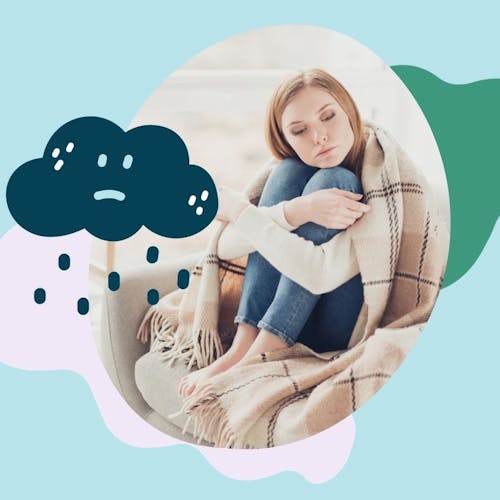This website uses cookies to enhance the user experience. By using Yoppie you are agreeing to our use of cookies.
Post Menstrual Syndrome Is Real Too
Written by Yoppie
24 Mar 2020
What is post-menstrual syndrome?
What causes post menstrual syndrome?
What can we do about post-menstrual syndrome?
You’ve most likely heard of pre-menstrual syndrome, but now it’s time to meet PMS’s tardy and oh-so-frustrating cousin, POST-menstrual syndrome. That’s right, this one comes about after your period, but can affect your body and mind in much the same way, if not more than the former.
Whether it’s bloating, lethargy, cravings, unexplained anger or depression, Post-Menstrual Syndrome can do things to you that you can’t always explain, at a time of the month that doesn’t really make sense according to everything you’ve ever read about periods - but it’s all too real for some women. Let’s dive into what Post-Menstrual Syndrome is and what we can do about it...
What is post-menstrual syndrome?
Post-menstrual syndrome has sort of been thought of as a myth for a long time, given that it’s not a medically recognised mood disorder like premenstrual syndrome or premenstrual dysphoric disorder (PMDD). Still, so many women getting post-menstrual syndrome symptoms can’t be wrong. More than 90% of women report that they get PMS, while only around 10% of women are believed to experience post-menstrual syndrome, that is to say, they get the same symptoms after their periods instead of before.
Just like the premenstrual kind, post-menstrual syndrome affects women’s bodies in the days following the end of their period, and can also cause mood changes. We wrote a whole blog about how hard PMS can be on your mental health, with symptoms ranging from erratic mood swings, to anger, to prolonged periods of depression. Post-menstrual syndrome offers similar feelings, just at a different phase of your cycle. Luckily, if you’re prone to post-menstrual syndrome, then you’re probably not likely to experience premenstrual syndrome, and vice versa. Phew. Nobody needs that kind of drama twice in one month!
What causes post menstrual syndrome?
Dr Lara Briden, author of the Period Repair Manual, states that she has found post-menstrual syndrome to be mostly associated with situations where ovulation does not occur, like polycystic ovary syndrome (PCOS) and some contraceptives. To look at it scientifically, premenstrual syndrome is thought to be triggered by lower levels of progesterone, while post-menstrual syndrome is likely to happen when there is excess oestrogen and androgens in the system.
Standard PMS (the premenstrual kind) has been studied throughout the years, and doctors know the score when it comes to symptoms and treatment. Post-menstrual syndrome, however, isn’t as common or well understood. As well as the above, other triggers were originally thought to be things like vitamin B6 deficiencies, fluctuating glucose metabolism, and electrolyte imbalances, but these have all been disproven in recent years.
What can we do about post-menstrual syndrome?
Knowing that post-menstrual syndrome can be related to conditions like PCOS means it’s always a good idea to investigate the potential underlying reasons for post-period symptoms by speaking to your GP. Similarly, if you are experiencing particularly distressing symptoms such as severe depression or anxiety, then it’s important that you discuss this with your GP too, so they are aware and can talk to you about your options.
Keeping a diary is also advisable, as many women don’t realise for years that what they are experiencing is in fact post-menstrual syndrome. Standard PMS is talked about a lot, but not many women really consider that they may be having issues after their monthly period has gone. Write down how your body and mind feels throughout the month, and try to do this for at least three months in order to establish patterns and recognise symptoms.
As with premenstrual syndrome, there isn’t a huge amount that can completely lift symptoms, but you can start by taking care of yourself. This means eating well and getting a healthy amount of exercise, but it could also mean supplements. Magnesium supplements are thought to help ease the symptoms of premenstrual syndrome, and could do the same for post-menstrual syndrome according to Dr Lara Briden.
Remember that while post-menstrual syndrome is rare compared to regular PMS, it doesn’t make it any less difficult to deal with. Always discuss your symptoms and feelings with your doctor so they can help you work towards improving your situation.
Think you suffer from the "other" PMS? You’re not alone. Come and chat in our private Facebook group or drop us a note on Insta @itsyoppie, and don't forget that our personalised period subscription box can get organic tampons, pads, liners (and more) delivered easily and regularly through your letterbox. That's one less worry each month!
Fact checked by Doctor Samantha Miller.
Section jump
Back to top
Subscribe To Our Newsletter
YOPPIE





© 2026 Yoppie is a registered trademark of Phlo Technologies Ltd.
Yoppie's supplements are not a substitute for a varied diet and healthy lifestyle and are not intended to diagnose, treat, or cure any disease. If you are pregnant, breastfeeding, have a medical condition or are under medical supervision, please consult with your doctor before taking any of our products.






